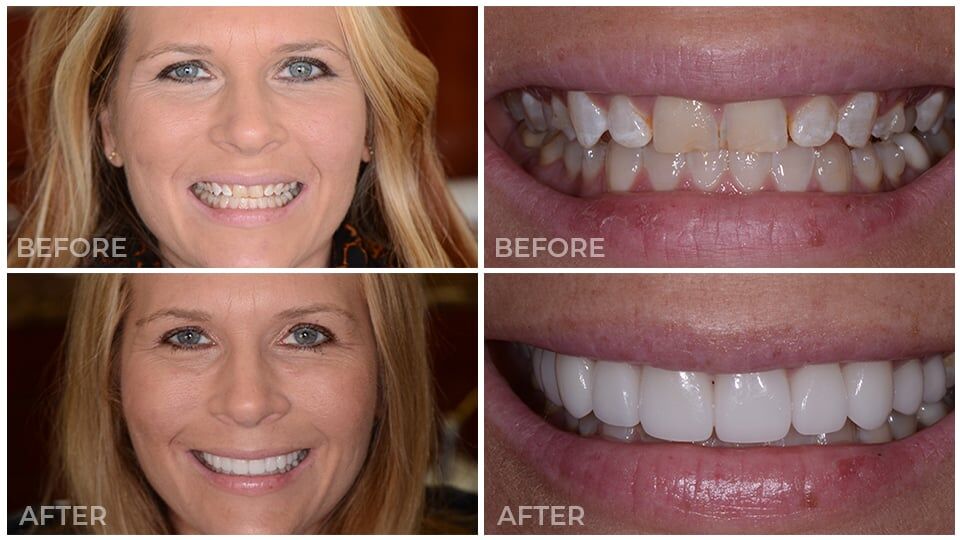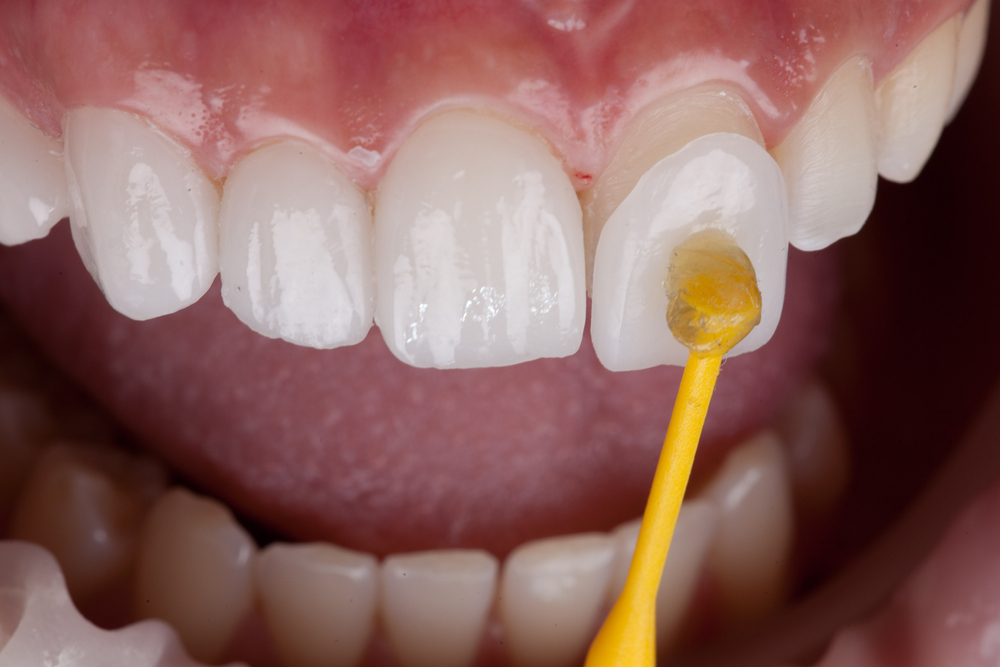The Full Overview of Veneers: Types, Utilizes, and Their Effect on Your Smile
Veneers work as a preferred service for individuals seeking to enhance their oral visual appeals. These custom-crafted coverings can effectively mask blemishes such as staining and gaps. With 2 key kinds available, porcelain and composite material, each deals distinct benefits and limitations. The effect of veneers expands past plain look, influencing self-esteem and social interactions. Comprehending their benefits and types is crucial. What might this imply for one's general lifestyle?
Recognizing Veneers: What They Are and How They Work
Veneers are thin shells, normally made from porcelain or composite material, that are custom-crafted to fit over the front surface area of teeth. They offer both functional and visual purposes, offering a service for different dental imperfections such as discoloration, gaps, and minor misalignments. By adhering to the tooth enamel, veneers create an all-natural look while boosting the form and color of the teeth.
The process typically involves a preliminary examination, where a dentist analyzes the individual's demands and discusses wanted end results - Veneers Teeth. Following this, a minimal quantity of enamel might be eliminated to suit the veneer. Impacts of the teeth are after that taken to guarantee a precise fit. As soon as made, the veneers are bound securely to the teeth utilizing a special oral adhesive. This procedure not only boosts the smile's appearance but additionally assists protect the underlying teeth from more damage, making veneers a prominent choice for several seeking a smile makeover
Kinds of Veneers: Porcelain vs. Composite Material
The difference in between porcelain and composite resin veneers lies in their material composition and features. Each type provides differing degrees of expense, longevity, and longevity, influencing patients' options based upon their individual requirements. Understanding these differences is crucial for making an informed decision relating to dental enhancements.
Product Distinctions Explained
While both porcelain and composite resin veneers serve the very same cosmetic purpose, they differ considerably in product properties, sturdiness, and visual end results. Porcelain veneers are crafted from a ceramic product that simulates the all-natural translucence of teeth, offering a realistic look. Their smooth surface area is immune to discoloration, making them an enticing choice for those looking for a durable visual. On the other hand, composite material veneers are made from a tooth-colored plastic material, providing versatility and simplicity of application. Nevertheless, they might not accomplish the same level of illumination or clarity as porcelain. Furthermore, composite veneers can be much more conveniently shaped and fixed, making them an extra flexible option in certain oral circumstances. Each kind offers one-of-a-kind advantages tailored to private preferences.
Longevity and Sturdiness
When comparing porcelain and composite resin veneers, durability and durability are significant factors. Porcelain veneers are recognized for their toughness, commonly long lasting 10 to 15 years with correct treatment. Their strength against chipping and tarnishing makes them a favored selection for individuals seeking long-term outcomes. On the other hand, composite material veneers commonly have a shorter lifespan, balancing 5 to 7 years. While they can be repaired extra conveniently if harmed, they are more susceptible to wear and staining with time. The selection between these materials typically depends on the individual's lifestyle, aesthetic goals, and upkeep preferences. Ultimately, understanding the differences in long life and sturdiness can assist clients in choosing the veneer kind that best matches their demands.
Price Contrast Insights
Cost is a vital factor to consider when selecting between porcelain and composite material veneers. Porcelain veneers generally vary from $800 to $2,500 per tooth, reflecting their sturdiness, aesthetic allure, and resistance to staining. These veneers need an extra comprehensive treatment and specialized laboratory work, adding to their higher cost. On the other hand, composite resin veneers are normally extra budget friendly, setting you back between $250 and $1,500 per tooth. They can be applied in a single see, which lowers labor costs. Nevertheless, composite veneers might require a lot more constant substitutes, possibly increasing long-term expenses. Inevitably, the option between porcelain and composite resin veneers depends on specific budgets and desired results, balancing initial costs against durability and aesthetic results.
The Benefits of Picking Veneers for Your Smile
Selecting veneers provides considerable benefits for those seeking an enhanced smile. Their boosted visual charm can transform the appearance of teeth, while their stain-resistant residential properties assure an enduring illumination - Porcelain Veneers. This combination makes veneers a prominent choice for individuals looking to attain a remarkable smile
Improved Aesthetic Appeal
Veneers frequently arise as a favored remedy due to their transformative aesthetic benefits when people look for to improve their smiles. These thin shells, normally made from porcelain or composite resin, can effectively hide flaws such as chips, gaps, and imbalance. By simulating the all-natural appearance of teeth, veneers supply a smooth, glowing smile. Their customizable nature enables a tailored approach, allowing individuals to pick shades and forms that finest suit their face functions. Additionally, veneers can develop a consistent appearance, boosting overall face proportion. This visual enhancement not only improves confidence however can additionally positively influence social interactions and individual connections, making veneers a preferred choice for those seeking to achieve a brighter, much more eye-catching smile.
Stain Resistance Perks
Veneers not just enhance aesthetic charm yet also provide substantial tarnish resistance, making them an attractive choice for people worried about preserving an intense smile. Composed of sturdy products such as porcelain or composite material, veneers are less permeable than all-natural teeth, which aids avoid the absorption of spots from typical wrongdoers like coffee, tea, and merlot. This fundamental discolor resistance enables people to appreciate their preferred beverages without fretting about staining. Veneers Teeth. In addition, the smooth surface area of veneers makes them easier to clean, further improving their longevity and preserving their immaculate appearance. Consequently, veneers supply a sensible remedy for those seeking More Info both appeal and capability in their oral care
The Process of Getting Veneers: What to Expect

Although the procedure of obtaining veneers might appear challenging, comprehending the actions involved can alleviate issues. A consultation with a dental practitioner is needed to figure out if veneers are the proper solution for the person's dental concerns. During this appointment, the dentist will discuss desired outcomes and take impressions of the teeth.
Next off, a second appointment is arranged for tooth preparation, where a percentage of enamel is generally removed to accommodate the veneers. Temporary veneers may be positioned while the custom-made ones are crafted in a dental laboratory, which normally takes a number of weeks.
Once all set, the dental practitioner will certainly position the veneers, making sure proper fit and shade before bonding them to the teeth making use of a special adhesive. After final like it modifications, the dental professional will certainly offer advice on care. Recognizing these steps can assist people feel extra comfortable and notified throughout the veneer procedure.
Maintenance and Look After Your Veneers
Maintaining veneers needs constant like ensure their long life and look. Correct dental hygiene is essential; brushing two times daily with a non-abrasive tooth paste and flossing frequently aid prevent plaque accumulation around the veneers. Furthermore, regular oral exams are vital for keeping track of the condition of the veneers and attending to any kind of possible concerns early.
When attacking to avoid damage, people should prevent hard foods and excessive pressure. It's also recommended to limit consumption of staining substances, such as coffee, tea, and merlot, as these can affect the veneers' shade gradually.

Transforming Your Smile: Real-Life Influence of Veneers
A radiant smile can substantially enhance one's self-confidence and general look. For several individuals, veneers act as a transformative remedy, effectively attending to various oral concerns such as staining, spaces, and imbalance. These thin coverings, tailor-made to fit over the front of the teeth, can create an unified and aesthetically pleasing smile.
Real-life instances illustrate the profound influence veneers can have. People often report an instant increase in self-worth and social communications following their procedure. The newly found self-confidence can lead to even more possibilities in professional and individual life, as people really feel more inclined to engage and express themselves.
In addition, the mental benefits prolong past simple look; lots of experience enhanced psychological well-being as they welcome their smiles. Consequently, veneers not just enhance physical attributes however also add significantly to overall quality of life, underscoring their worth in cosmetic dental care.
Frequently Asked Concerns
For How Long Do Veneers Usually Last Prior To Needing Replacement?
Veneers commonly last between 10 to 15 years before calling for substitute. Elements such as dental hygiene, oral practices, and the kind of material made use of can influence their long life and total toughness. Regular dental exams are recommended.
Can Veneers Be Removed, and if So, Just how?
Yes, veneers can be removed. A dental expert usually uses customized devices to thoroughly detach them from the teeth, guaranteeing marginal damage to the underlying enamel, commonly complied with by required changes or repairs for suitable visual appeals.
Are Veneers Suitable for Every person's Oral Problem?

Will Getting Veneers Pain or Require Anesthetic?
Obtaining veneers normally entails very little pain, and numerous people get local anesthesia to assure a pain-free experience. Sensitivity might occur momentarily afterward, yet most discover the process bearable and are satisfied with the outcomes.
How Do Veneers Affect Tooth Level Of Sensitivity After Placement?
Veneers can briefly raise tooth sensitivity as a result of the elimination of enamel and the bonding procedure. The majority of individuals experience a decrease in sensitivity in time as the teeth readjust to the brand-new veneers.
Veneers are slim coverings, usually made from porcelain or composite resin, that are custom-crafted to fit over the front surface of teeth. Porcelain veneers are crafted from a ceramic product that imitates the all-natural transparency of teeth, providing a natural appearance. Porcelain veneers generally range from $800 to $2,500 per tooth, mirroring their longevity, visual allure, and resistance to staining. In comparison, composite resin veneers are typically extra cost effective, costing between $250 and $1,500 per tooth. Composed of long lasting materials such as porcelain or composite material, veneers are less permeable than natural teeth, which helps protect against the absorption of spots from usual wrongdoers like coffee, tea, and red a glass of wine.